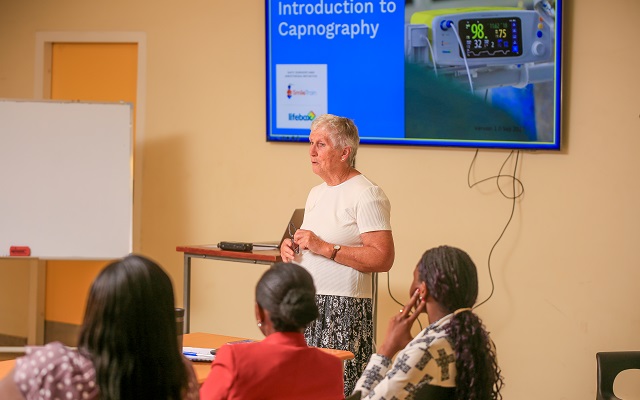
Not-for-profit, Smile Train, to offer 54 high-quality capnographs
Kampala, Uganda | PATRICIA AKANKWATSA | In a ground-breaking initiative, Smile Train is pioneering a comprehensive program to enhance the safety of paediatric anaesthesia and improve the care of children with cleft conditions across the country. Through a combination of specialised training for anaesthetists and the distribution of cutting-edge capnography equipment, the organisation is poised to make a lasting impact on healthcare for Uganda’s youngest and most vulnerable patients.
In partnership with the safer surgery global non-profit, Lifebox, to address a major gap in anaesthesia safety in Uganda with the Smile Train-Lifebox Capnograph project, a total of 96 anaesthesia providers were trained in life-saving capnography monitoring ahead of the distribution of 54 high-quality capnographs in selected hospitals on September 15 at Mulago National Referral Hospital, Kampala.
This is the first training in Uganda of the Smile Train-Lifebox Capnograph Project – a new program to improve anaesthesia safety for children and patients with cleft – held in partnership with the Association of Anaesthesiologists of Uganda.
While speaking at the training launch, Dr. Elizabeth Igaga, Director of Programs Safety at Smile Train said that Capnographs will be distributed, alongside training, to anaesthesia providers worldwide this year.
Capnography is the monitoring of the concentration or partial pressure of carbon dioxide (CO2) in the air we breathe out mainly during anesthesia and intensive care. It uses a machine called a capnograph.
Dr Igaga said the major improvements in quality and safety in anaesthesia over the last 30 years have resulted from advances in technology, refinements in anaesthesia equipment and drugs, and a focus on education and training. She said, however, this technology has remained inaccessible for many operating rooms and intensive care units in Africa.
“By making a device that is affordable and accessible, The Smile Train-Lifebox Capnograph will significantly bridge this gap,” she said.
International standards for the safe practice of anaesthesia have been defined, and were adopted by the World Federation of Societies of Anaesthesiologists (WFSA).
Alongside developing a comprehensive capnography training package for anaesthesia providers, Smile Train and Lifebox is making capnographs accessible with the new Smile Train-Lifebox Capnograph – an affordable, user-friendly, high-quality device with sturdy construction and long battery life.
Dr. Mary T. Nabukenya, a paediatric anesthesiologist at Makerere University said that paediatric anaesthesia presents unique challenges, requiring specialised knowledge, equipment, and vigilance.
“As an anaesthesiologist, I know how daunting it is to provide anaesthesia to a patient without capnography. No anaesthesia provider should have to work without this critical device – and no patient should have to undergo surgery under general anaesthesia or sedation without it,” she said.
Capnographs help ensure that the breathing tube is properly placed during surgery. Misplacement of this tube is a leading cause of anaesthesia-related complications and deaths in low-resource settings.
The risk of misplacing the breathing tube is greater in children, so access to capnography is essential for the safe provision of surgery for children. Despite capnography being universally mandated in anaesthesia guidelines in high-income countries, it remains largely unavailable across many low-resource settings.
According to research conducted by the Association of Anaesthesiologists. 23% of anaesthetists have the facilities to deliver safe anaesthesia to an adult, 13% to deliver safe anaesthesia to a child and 6% to deliver safe anaesthesia for a Caesarean section in Uganda.
Dr. Joseph Kiwanuka Kyobe, anaesthesiologist, at Mbarara University of Science & Technology and President of the Association of Anaesthesiologists of Uganda, said that many anaesthesia colleagues across Uganda do not have access to capnography as part of their routine monitoring patients undergoing surgery.
“The Association of Anaesthesiologists of Uganda is proud to partner with Smile Train and Lifebox in equipping and training our country’s anaesthesia workforce to deliver the safest care possible for our patients,” he said.
The Smile Train- Lifebox Capnograph meets robust specifications for the monitoring of paediatric patients and use in low-resource settings and underwent laboratory and field testing.


